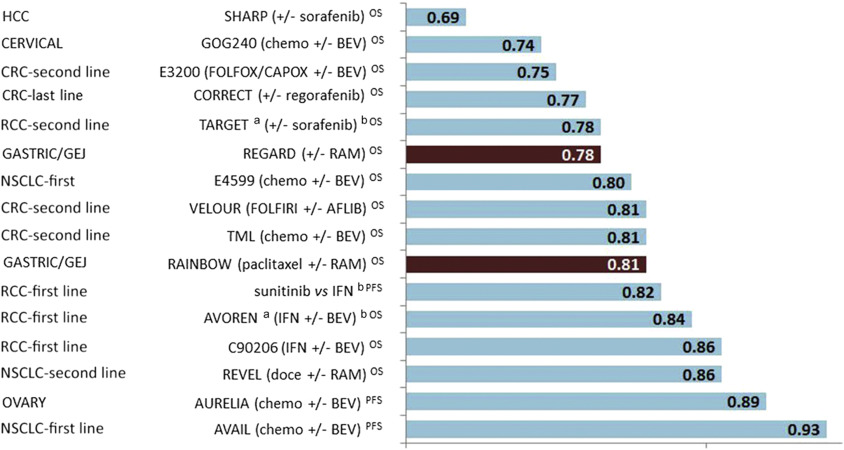Antiangiogenesis therapy is one of only 2 biologically targeted approaches shown to improve overall survival over standard of care in advanced adenocarcinoma of the stomach or gastroesophageal junction (GEJ). Therapeutic targeting of vascular endothelial growth factor receptor 2 improves overall survival in patients with previously treated advanced gastric/GEJ adenocarcinoma. No antiangiogenesis therapy has demonstrated an overall survival benefit in patients with chemo-naïve or resectable esophagogastric cancer or in patients whose tumors arise from the esophagus. Promising ongoing clinical investigations include the combination of antiangiogenesis therapy with immune checkpoint inhibition and anti–human epidermal growth factor receptor 2 therapy.
Key points
- •
Antiangiogenesis therapy is one of only 2 biologically targeted approaches (the other being anti–human epidermal growth factor receptor 2 [HER2] therapy) shown to improve overall survival over standard of care in advanced adenocarcinoma of the stomach or gastroesophageal junction (GEJ).
- •
Therapeutic targeting of vascular endothelial growth factor receptor 2, either its extracellular domain (ramucirumab) or tyrosine kinase domain (apatinib), has been demonstrated to improve overall survival in patients with previously treated advanced gastric/GEJ adenocarcinoma.
- •
To date, no antiangiogenesis therapy has demonstrated an overall survival benefit in patients with chemo-naïve or resectable esophagogastric cancer or in patients whose tumors arise from the esophagus.
- •
Promising clinical investigations include the combination of antiangiogenesis therapy with immune checkpoint inhibition and anti-HER2 therapy.
Introduction
Gastric and esophageal cancers are the fifth and eighth most common malignancies worldwide, respectively, with a combined global incidence of 1.4 million cases yearly. In the United States, an estimated 43,280 new cases and 26,420 deaths from gastroesophageal cancer will occur in 2016. Prognosis remains poor for this patient population with a 5-year-overall survival (OS) rate of 29% and 20% for gastric and esophageal cancer, respectively, underscoring the need for novel therapies.
Angiogenesis is primarily mediated by the interaction between vascular endothelial growth factor (VEGF) and its receptors and is critical for tumor growth, progression, invasion, and metastasis. Angiogenesis inhibitors have demonstrated generally modest clinical benefit over the standard of care across multiple tumor types ( Fig. 1 ).







